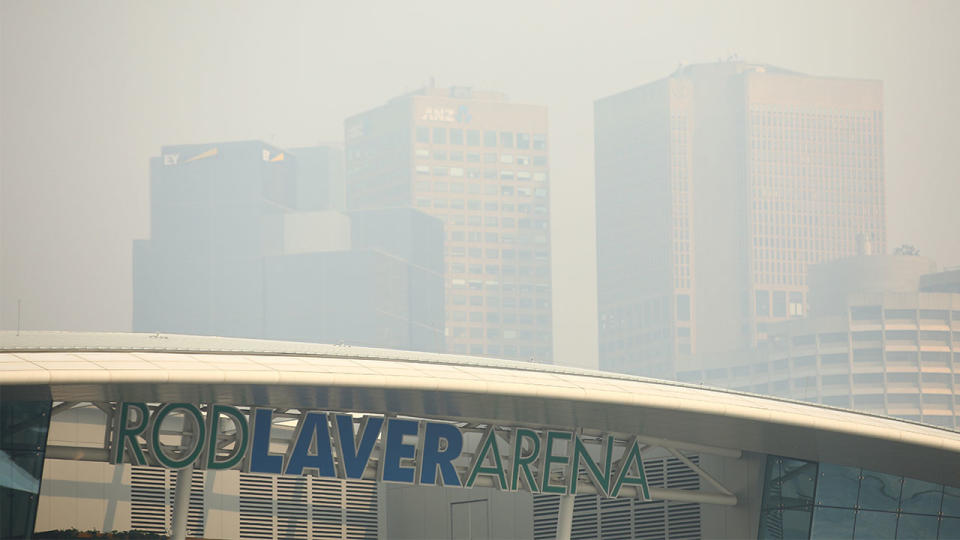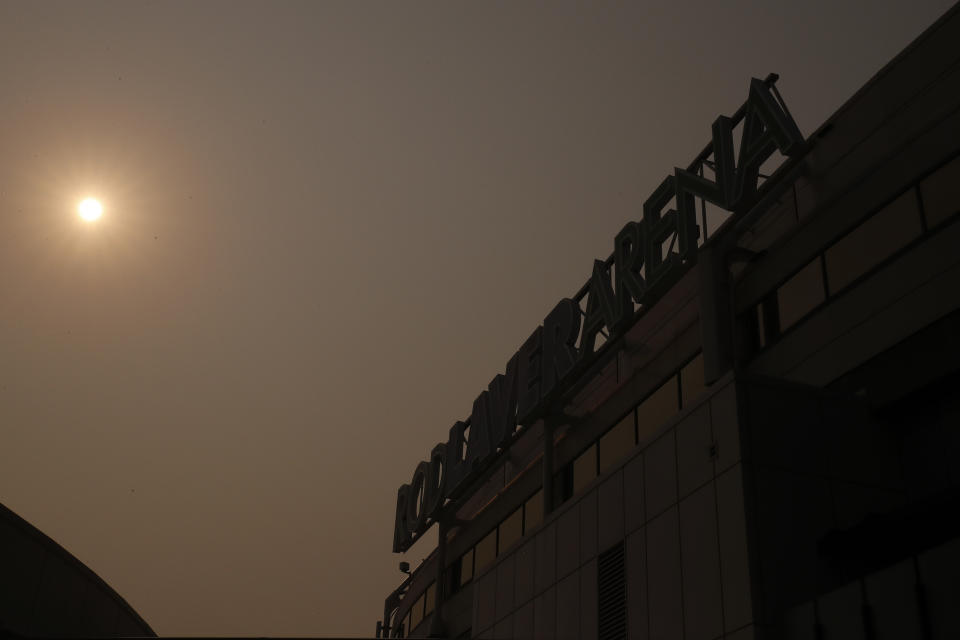How will the Australian Open be affected by the bushfires?
This month's Australian Open tennis Grand Slam will take place during a bushfire crisis that has left at least 26 people dead and destroyed more than 2,000 homes.
Blazes across the country have torched about eight million hectares (80,000 square kilometres) of land, sending air pollution soaring.
'ENTIRE CITY CHOKING’: Aus Open qualifying delayed by 'hazardous' bushfire smoke
In the week leading up to the Grand Slam, Australian Open tennis organisers were forced to suspend practice and postpone the start of the qualifying tournament as heavy smoke from Victoria's bushfires blanketed Melbourne Park.
In light of the recent events, here is a look at how the bushfires could affect the Australian Open and how the tournament will mitigate any potential affects to the schedule.

What are the dangers?
Air pollution is the big risk for the Australian Open. Smoky conditions could pose health problems for players, fans and officials, especially in the high temperatures of the Australian summer.
Melbourne hasn't been as badly affected by pollution as Sydney or Canberra, but thick haze last week prompted speculation that the Australian Open could be delayed. However, Tennis Australia CEO Craig Tiley said the tournament should go ahead as expected.
"All the information we have at the moment, with qualifying coming up next week, is that the forecast is good, we don't expect any delays and we've implemented additional measures to ensure the Australian Open will be able to run as scheduled," Tiley said.
How bad can it get?
Fires are still burning in Victoria, where Melbourne is the state capital, and could continue throughout the tournament, with huge blazes to the host city's east.
"It is going to depend on the prevailing winds and whether we have ongoing fires," Christine Jenkins, professor of respiratory medicine at the University of New South Wales in Sydney, told AFP.
'CURRENT AND CONCRETE’: 'Bombshell' twist in Federer-Greta spat
"It's still an open question just whether or not we could still have further periods of intense pollution."
Jenkins said that so far, Melbourne hasn't seen pollution bad enough to postpone the tournament.
"(But) there is very definitely the threat of fire that could cause significant air pollution in Melbourne if things get worse at any point," she said.
What are the health risks?
Players who are recovering from respiratory tract infections are particularly at risk, as well as those with asthma.
Pollution can irritate the respiratory tract, intensifying and prolonging symptoms - but the health dangers don't stop there.

"It (pollution) increases the risks of respiratory symptoms, cardiovascular disorder, eye symptoms, or mental disorders," warned Professor Yuming Guo, head of the Climate, Air Quality Research Unit at the School of Public Health and Preventive Medicine at Monash University in Melbourne.
"All these would influence of the performance of the players." Players and fans should stay hydrated, avoid alcohol and limit their time outside, Jenkins said.
What's being done for the players?
Meteorological and air-quality experts will be on site to monitor conditions. Any smoke hazards will be treated in a similar way to extreme heat and rain, with umpires able to stop play if air monitoring shows it is too dangerous to continue.
Melbourne Park, the venue for the Australian Open, has three roofed stadiums and eight other indoor courts. While facemasks are impractical for players, Jenkins advised them to stay hydrated and get plenty of rest.

"Staying well hydrated keeps the respiratory membranes well moistened and less prone to irritative symptoms," she said.
"Avoiding alcohol, getting plenty of rest, sleeping normal hours and not being outdoors any more than you need to be. Difficult for players, because they're on practice courts and they're constantly trying to keep their (practice) hours up."
How have the players responded?
World No.2 and ATP Player Council President Novak Djokovic recently praised the ATP Cup tournament for looking ahead and taking precautions in case of severe smoke haze.
"It was the right move; there's been a lot of talk and I'm really glad that Tennis Australia's taking all the necessary measures," he said ahead of Serbia's move from Brisbane to Sydney for the ATP Cup quarterfinals.
"They have the three covered courts plus the eight additional indoor courts, which is going to be enough if it comes to the extreme conditions."

Following the ATP Cup, the ATP announced it would donate $725,000 to the WWF Australian Wildlife and Nature Recovery Fund as part of the bushfire relief efforts, the governing body of men's tennis says.
The donation from players was announced by Novak Djokovic and Rafael Nadal after Serbia defeated Spain to capture the inaugural ATP Cup team event in Sydney.
Serena Williams also generously donated her $62,000 winner's cheque from the Auckland Classic to the Australian bushfire relief fund and described how the tragedy had affected her deeply.
The world’s top players have also banded together to take part in a charity event to help raise money for the bushfire relief appeal.

Has haze affected other events?
Last month's SOLAS Big Boat Challenge in Sydney was cancelled after thick smoke from bushfires sent visibility plunging on Sydney Harbour.
A Big Bash cricket match in Canberra was also scrapped because of poor air quality and visibility.
But most sports fixtures have gone ahead. Australia played cricket Test matches against New Zealand in Melbourne and Sydney. And the 10-day the ATP Cup tennis tournament has proceeded in Sydney, Brisbane and Perth without serious problems.
Could the Australian Open be cancelled?
Unlikely. Even if air pollution soars, organisers would be reluctant to axe what is perhaps Australia's biggest sports event of the year, and one of only four Grand Slam tournaments on the tennis calendar.
According to The Australian newspaper, they will be well covered if they do: an insurance policy will provide a hefty pay-out stretching into nine figures in the event of a cancellation due to extreme weather.
However, at least one health expert would support delaying or axing the tournament altogether if air quality remains low.
"If the air pollution is still serious, it would be better to postpone or cancel it," said Guo.
"People when playing or exercising are more affected by air pollution, because they inhale deeply forcing air into their lower respiratory system where air pollutants accumulate with prolonged exposure."
With AFP and AAP

